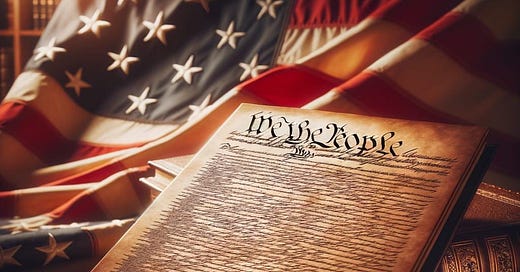In my notes, I have often made mention of our U.S. Constitution. For those unfamiliar with it, our Constitution went into effect on March 4, 1789 (235 years ago). That time was different than the one we find ourselves in today.
To understand it’s limits is to understand why a new one must be written where all can come to the proverbial table and share their voice and their vision.
The U.S. Constitution was written by a select few: white men of a certain social standing, most of English ancestry. Colloquially, “white moneyed men.” Native Americans were not included in this process; women were not included in this process; and blacks were not included in this process. The authors were a fairly homogenous group. How could we possibly expect them to understand the desires, hopes, and vision of this new nation with so little of it represented?
“In a letter dated March 31, 1776, Abigail Adams writes to her husband, John Adams, urging him and the other members of the Continental Congress not to forget about the nation’s women when fighting for America’s independence from Great Britain.
‘The future First Lady wrote in part, “I long to hear that you have declared an independency. And, by the way, in the new code of laws which I suppose it will be necessary for you to make, I desire you would remember the ladies and be more generous and favorable to them than your ancestors. Do not put such unlimited power into the hands of the husbands. Remember, all men would be tyrants if they could. If particular care and attention is not paid to the ladies, we are determined to foment a rebellion, and will not hold ourselves bound by any laws in which we have no voice or representation.’”
No voice. No representation.
How many groups did not have representation? How many were purposefully excluded from the process?
Was this not the reason behind our fight for independence? “No taxation without representation?” How could these men so quickly lose sight of that aim? The tyranny they resented was the tyranny they imposed.
No taxation without representation.
By their own intent, how could we be bound by any their laws?
Those not represented then are still largely not represented today.
In all this time, how has so little progress been made? Why have we been so slow to implement broad, sweeping changes? Why have we allowed power to remain in the hands of those least willing to share it? Is familiarity more important than freedom? And why are women so comfortable believing they are less than they are? Why do we wait? What are we waiting for?
We have allowed religions to dictate the way we dress, the way we govern our lives, and when and why we have sex. Men have played their role, but so have we women. We have been willing to surrender to this authority-any authority other than our own.
“Real women are those who forego their own interests.” How can this be so?
Our men do not define us. Neither do our children. We are our own purpose. And that purpose may involve children, or it may not. We choose.
So, when we want movement, why do we allow the pace to be so glacial? Who does this serve? It’s usually men-though not always-who say, “Now wait a minute. That is a step too far, too fast. Let’s be grateful for these microsteps. We were there, and now we are here. Isn’t that enough, for now?”
It is not.
We can have some, or we can have all.
Some might argue every step forward is a step closer, and there would be some truth to this, certainly. But when will we be full partners on our terms?
Have you encountered others-on city boards, business boards, and political committees-who believe that in order for change to be worthwhile, it must be incremental? The process must be slow. It must take time. Obstacles must be overcome. They seem unable to envision a process that could be anything other than this.
Why, though? Why is this so for these persons? Is this honestly what they believe? Were they taught this is the way things are? Has this been their experience to date? Are they limited in the ways they approach change? Is it their way of preventing real change from happening?
So often we are told, “Now is not the time.”
When is the “right time?” When is the appropriate moment?
Why do we allow others to define our progress and our paths forward?
A new constitution should be written, one where all parties are represented.
We could voice our vision directly. An app could assist with this.
The amendment process is slow, unwieldy, and unnecessary. It does not need to be. We can keep the parts we like, remove the parts we don’t, add in the ones we want. “We, the people,” can vote, and we can vote directly. We can retain a general governmental infrastructure while still allowing the people to decide their day-to-day governance.
We have tried the way of our forefathers.
Let’s try a new way
https://www.history.com/this-day-in-history/abigail-adams-urges-husband-to-remember-the-ladies.
Photo Credit: Justin Stanelle






The issue I have with SCOTUS and all those who “interpret “ constitutional law, it’s not relevant today!! The fight against the old white guys and their Christian nationalist views is going to be difficult!!
They were aware that it was not perfect for the ages, although they might differ on the reasons. It was far ahead of its time. They expected their product, the Constitution, would be updated by Amendments. It was amended often, until it wasn’t. The ERA is 100 years old and never was ratified by enough states. I am afraid a new version in these troubled days would be worse and/or never ratified.